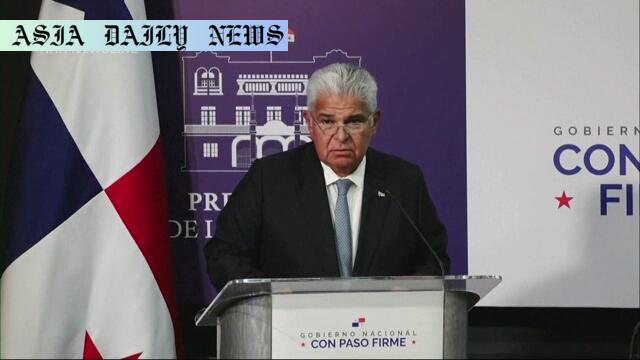Panama Canal: Panama reassures sovereignty while declining to renew the Belt and Road agreement with China, prioritizing national control.
Panama will not renew its agreement with China on the Belt and Road Initiative.
President Mulino reaffirmed Panama’s sovereignty over the Panama Canal.
US concerns about Chinese influence near the canal are being addressed through audits.
Mulino’s administration may end the Belt and Road agreement earlier than scheduled.

Panama’s Decision to Reject Renewal of Belt and Road Deal
Panama has made a bold announcement under the leadership of President Jose Raul Mulino, signaling a shift in its diplomatic and economic strategy by choosing not to renew the 2017 agreement with China on the Belt and Road Initiative (BRI). The agreement initially sought to integrate Panama into a massive global economic network championed by China, but its continuation has sparked debate over national interests and sovereignty.
Reinforcing Panama’s Sovereignty Over the Canal
President Mulino was unequivocal in reaffirming Panama’s control over the Panama Canal, emphasizing that the pivotal waterway remains under Panamanian sovereignty. During a meeting with U.S. Secretary of State Marco Rubio, Mulino reassured that “there is no doubt that the canal is operated by our country and will continue to be so.” This statement comes at a crucial time, as discussions about Chinese involvement and influence near one of the world’s most critical commercial passages grow louder.
Addressing U.S. Concerns and Conducting Audits
The rising influence of China near the canal has drawn the attention of the United States, given the canal’s significance in global trade and U.S. economic interests. Panama’s government is auditing a Hong Kong-based company’s operations at two ports located near the entrance of the canal, signaling a proactive approach to potential security concerns. This reflects President Mulino’s balanced stance to address U.S. anxieties while ensuring Panama’s self-determination.
Ending the Belt and Road Initiative Agreement
Mulino’s decision to terminate the Belt and Road agreement marks a pivot in Panama’s foreign relations. Signed in 2017, the agreement aligned Panama with China’s ambitious global economic strategy. However, the decision to not renew the deal highlights a re-evaluation of its long-term implications for Panama’s sovereignty and strategic interests. Mulino has hinted at a possibility of ending the agreement earlier than its prospective expiration, reinforcing this shift in foreign policy.
Implications for Panama’s Political and Economic Future
This decision is likely to have significant economic and political repercussions. On one hand, it could strengthen ties with the United States and other Western nations who view China’s growing influence with skepticism. On the other hand, it could impact Panama’s trade relationships with China, which has been a major economic partner in recent years. The delicate balance between national sovereignty and international cooperation will remain at the forefront of Panama’s strategic decisions.
Broadening Migration Measures
Simultaneously, President Mulino discussed measures to tighten Panama’s role in curbing illegal migration to the United States. This initiative aligns with the broader efforts to strengthen Panama-U.S. collaboration, focusing on issues beyond trade and economic agreements.
A Future Centered on Sovereignty
While the immediate outcomes of ending the Belt and Road Initiative remain uncertain, Panama’s message is clear: its sovereignty over critical assets like the Panama Canal will not be compromised for any external partnership. By navigating these complex international waters, Panama aims to assert its independence while fostering relationships that align with its national interests.
Commentary
Panama’s Sovereignty Stands Firm
President Jose Raul Mulino’s declaration to reject the renewal of the Belt and Road Initiative agreement with China sends a powerful message to the global community: Panama values its sovereignty above all else. In a world increasingly intertwined by global economic networks, such decisions are significant not just for the country itself but also for the delicate balance of global geopolitics.
A Calculated Move Amidst Geopolitical Tensions
There is almost certainly a geopolitical dimension to this decision. The endorsement of U.S. concerns regarding Chinese influence by conducting audits on nearby ports demonstrates Panama’s position as a responsible actor on the international stage. It also hints at strategic calculations to strengthen partnerships with Western powers, particularly the United States, without completely alienating China.
The Role of the Panama Canal in Global Trade
The Panama Canal has historically been not only a driver of Panama’s economy but also a symbol of its sovereignty. As global trade evolves, ensuring that the canal remains under Panamanian control bolsters the nation’s autonomy and reaffirms its significance in global trade routes. Plausibly, this autonomy may still pave the way for future partnerships, albeit on terms more favorable to Panama’s interests.
A Balancing Act for the Future
Although politically and economically intricate, Mulino’s decision reflects the growing skepticism in the international community toward certain aspects of China’s Belt and Road Initiative. It is commendable that Panama is keenly assessing both the short-term and long-term implications of international agreements, ensuring that they align with national priorities.
Ultimately, Panama’s decision reaffirms its commitment to balancing international partnerships while upholding its fundamental values of sovereignty and self-determination. This balancing act will continue to shape Panama’s foreign policy in the years to come, serving as an example for other nations navigating similar challenges.


